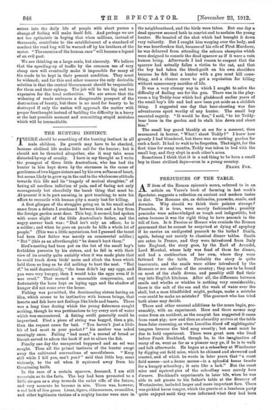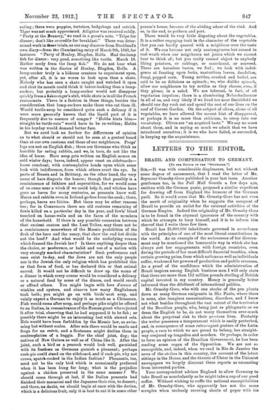PREJUDICES OF THE TABLE.
AN item of the Roman epicure's menu, referred to in an article on Varro's book of farming in last week's Spectator, suggests a reflection on ancient and modern tastes in diet. The Romans ate, as delicacies, peacocks, snails, and dormice. Why should we think their palates strange P Peacocks, it is true, were merely fashionable ; possibly peacocks were acknowledged as tough and indigestible, but eaten because it was the right thing to have peacock in the bill of fare. Is it Persius or Horace who reminds the Roman gourmand that he cannot be surprised at dying of apoplexy if ho carries an undigested peacock to the baths P Snails, again, belong not merely to classical dinner tables. Snails are eaten in France, and they were introduced from Italy into England, the story goes, by the Earl of Arundel, Lord Marshal, whose lady was fond of them for dinner, and had a cochlearium of her own, where they were fattened for the table. Probably the story is quite inaccurate, and the snails were either introduced by the Romans or are natives of the country; they are to be found on most of the chalk downs, and possibly still find their way into English kitchens. After all, the difference between snails and whelks or winkles is nothing very considerable ; there is the salt of the sea and the wash of water over the shell, but a man blindfolded might, perhaps, make a mistake —or could he make no mistake ? The gourmet who has tried both alone may decide.
These and other unusual additions to the menu begin, pre- sumably, with an experiment. Here and there savour may come from an accident, as the essayist has suggested it came from roast pig; now and then an absurdity arrives at the table from false reasoning, as when Lucullus dined off nightingales' tongues because the bird sang sweetly ; but most must be due to bold experiment. There were great men who lived before Frank Buckland, though he, in the imagination of many of us, went as far as a pioneer may go, if he is to walk and talk afterwards. He began as a schoolboy at Winchester by digging out field mice, which he skinned and skewered and roasted, and of which he wrote in later years that " a roast field mouse—not a house mouse—is a splendid bonne bouche for a hungry schoolboy ; it eats like a lark." But the roast mice and squirrel-pies of the schoolboy were merely hors d'ceuvre. Buckland's experiments in later life, when he was able to ask guests to his father's table at the Deanery of Westminster, included larger and more important fare. There was pickled horse tongue, which the guests at a luncheon party quite enjoyed until they were informed what they had been
eating ; there were puppies, tortoises, hedgehogs and ostrich. Tiger was net much appreciated. Alligator was received coldly. "Party at the Deanery," we read in a guest's note. "Tripe for dinner; don't like crocodile for breakfast." There was deter- mined work in Were trials, as one may discover from Buckland's own diary—from the illuminating entry of March 9th, 1849, for instance. " Party of Huxley, Blagden, Rolfe. Had the lump fish for dinner: very good, something like turtle. March 10. Rather seedy from the lump fish." We do not hear what was written in the diaries of Huxley, Blagden, Rolls. A lump-sucker truly is a hideous creature to experiment upon, yet, after all, it is no worse to look upon than a skate. Nobody who has seen a skate caught and watched it open and shut its mouth could think it better-looking than a lump- sucker; but probably a lump-sucker would not disappear quickly from a fishmonger's slab, while skate is in all the French restaurants. There is a fashion in these things, besides the consideration that lump-suckers make those who eat them ill. Would turtle-soup be considered quite such a delicacy if it were more generally known that the liquid part of it is frequently due to essence of conger P "Hobbs hints blue— straight he turtle eats " would have to be re-written; Hobbs in his heyday would demand better fare.
But we need look no further for differences of opinion as to what should or should not be seen at a genteel board than at our own customs and those of our neighbours. Frogs' legs are not an English dish ; there are Germans who think us horrible for eating rabbits, and we, in turn, do not like the idea of horse. Hare soup gets written on English menus on cold winter days; hares, indeed, appear roast on sideboards— hares conchant, with contemplative heads upon which some look with indifference, from which others avert the eye. In parts of Russia and in Brittany, on the other hand, the very name of hare disgusts the hearer; though that possibly is a reminiscence of folklore and superstition, for we would none of us come near a witch if we could help it, and witches have gone as hares for many centuries, as peasants know well. Hares and rabbits even in Ireland go free from the cook ; there, perhaps, hares are fairies. But there may be other reasons too ; for in Connemara there are old customs remaining of fowls killed on a particular day in the year, and fowls' blood touched on house-walls and on the faces of the members of the household. If there is any possible connexion between that ancient custom and the Lost Tribes, may there not be a reminiscence somewhere of the Mosaic prohibition of the flesh of the hare and the coney, that chew the cud but divide not the hoof ? And what would be the underlying reason which framed the Jewish law P Is there anything deeper than the choice, or preference, or habit and use of a nation with very strongly marked characteristics P Such preferences and uses exist to-day, and the Jews are not the only people nor is the Jewish the only religion which has prohibited this or that form of food, or has declared this or that animal sacred. It would not be difficult to draw up the menu of a dinner in which every course would be considered a delicacy or a natural food by some of the diners, and would revolt or offend others. You might begin with hors d'oeuvre of winkles and oysters, and observe how many Englishmen took both; you might go on with birds'-nest soup, and vainly expect a German to enjoy it as much as a Chinaman. Fish would come after soup, and perhaps pike might be offered to an. Italian, in remembrance of the Roman guest who rejected it after trial, observing that he had supposed it to be fish ; or possibly there might be an interesting test with stewed eels. Eels would have been forbidden by the Mosaic law, as swim- ming but without scales. After eels there would be snails and frogs for an entree, and a Scotsman might decline them in contemplation of a haggis. For the chief joint, dog; the natives of New Guinea as well as of China like it. After the joint, such a bird as a peacock would look well, garnished with its feathers as Germans garnish a pheasant ; perhaps rook-pie could stand on the sideboard, and if rook-pie, why not crows, spatck-cocked in the Indian fashion ? Pheasants, too, need not be the only bird which is occasionally preferred when it has been hung for long; what is the prejudice against a chicken preserved in the same manner P We should come through at last, if the Italian peasants had finished their macaroni and the Japanese their rice, to dessert; and there, no doubt, we should begin at once- with the durian, which is a delirious fruit, only it is best to eat it in some other
person's house, because of the abiding odour of the rind. And so, in the end, to potheen and port.
There would be very little disputing about the vegetables. It is a rather engaging trait in the character of the vegetable that you can hardly quarrel with a neighbour over the taste of it. We can become not only contemptuous but roused to real wrath when our neighbours eat joints which we cannot bear to think of ; but you really cannot object to anybody liking potatoes, or cabbage, or sauerkraut, or seaweed. These are harmless tastes, we feel ; we look with indul- gence at feasting upon leeks, nasturtium leaves, dandelion, fungi, popped corn. Young nettles, crushed and boiled, are said to be as delicious as spinach ; we, who dislike spinach, allow our neighbours to try nettles as they choose, even, if they please, in a salad. We are tolerant, in fact, of all vegetarian impulses; there is a slumbering Nebuchadnezzar in all of us, and very likely if we lived too near Smithfield we should one day rush out and spend the rest of our lives on the roof of Covent Garden. On the subject of olives, alone of all vegetables, we have allowed the merest hint of disapproval, or perhaps it is no more than criticism, to creep into our vocabulary. Olives are "an acquired taste." We say no more about them, and in saying so much we admit that we have introduced ourselves ; it is we who have failed, or succeeded, in keeping up the acquaintance.















































 Previous page
Previous page